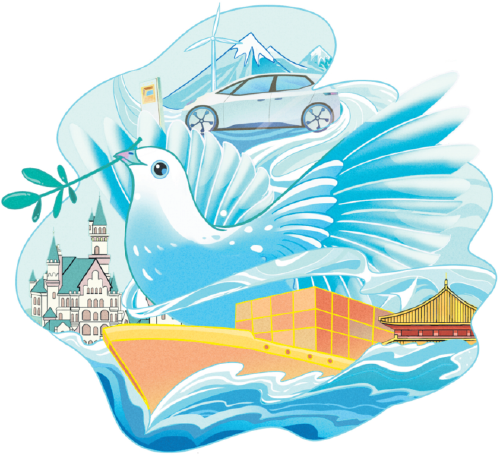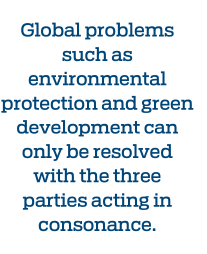The most important question European leaders have to deal with over the coming years will be how to position themselves vis-a-vis the US and China

Twenty years ago, in 2003, China and the European Union launched a comprehensive strategic partnership. Both sides' expectations were clearly set out in two documents that appeared nearly simultaneously. In its first ever EU policy paper, the Chinese government favored a steady development of political relations based on mutual respect, seeking common ground while reserving differences. It pledged to deepen economic cooperation and trade under the principles of mutual benefit and reciprocity. Likewise, the EU adopted a new strategy for a maturing partnership in which it defined priorities for relations with China, charting ways to raise the efficiency of the political dialogue and cooperation to promote the multilateral system and rules for global governance.
Since then, the development of economic relations has been outstanding. Trade has increased by nearly nine times; on average, both sides now trade $2 billion every day. European exports to China support about 4 million jobs in Europe; in China 16 million jobs depend on exports to the EU. After having been lower in 2020 and 2021 due to the impact of the COVID-19 pandemic, European investment in China increased by 70 percent to $12.1 billion in 2022.
Both sides gain: China is the largest contributor — of about one-third — to the global economic growth. While the EU's GDP is forecast to grow by 1.2 percent in 2024, China's GDP is set to increase by around 5 percent. For many EU companies, for example, in the automotive sector, China is an indispensable market; the EU is an equally essential destination for the tens of thousands of Chinese companies that fill several million containers which are shipped to Europe every year.
Politically there has, however, been some estrangement. This year's EU-China Summit on Dec 7 went smoothly; yet it appears that both sides did not come away with major results. European Commission President Ursula von der Leyen had stated in November that the way China positions itself on the Russia-Ukraine war would define the relationship with China for the years to come. The EU thinks that China buys oil from Russia at discounted prices and that some Chinese companies provide Moscow with dual-use goods. It also complains about its large trade deficit with China which, according to Eurostat, doubled over the past two years to reach nearly 400 billion euros ($436.28 billion) in 2022. The EU sees this as an indication of the insufficient openness of the Chinese market.
China asks the EU not to impede trade and investment and complains about what it sees as the EU's interference in its internal affairs on issues such as human rights. Regarding the trade deficit, Beijing points out that this has already decreased by nearly 17 percent in the current year. Chinese companies, the Chinese side stresses, produce innovative solutions swiftly and at low cost; their exports help bring about the green transition in Europe and elsewhere.
In the immediate future, the relationship between Brussels and Beijing could suffer because of the duties on electric vehicles. The Commission is launching an anti-subsidy investigation into EVs from China, which may account for one-third of the worldwide electric car exports by 2030. Within a year, Brussels might increase tariffs on Chinese EVs from the standard 10 percent.
This would, however, be misguided. Even the Association of German Automobile Manufacturers is critical of this investigation, because anti-dumping measures would in all probability be ineffective. In third countries, European tariffs would be toothless; in the EU, consumers would have to pay higher prices for Chinese EVs. Duties would also hit EVs produced by European companies in China and exported to the EU, and they could be circumvented by Chinese companies setting up subsidiaries in Europe.
The market share of Chinese EVs in the European market is up to 8 percent so far this year. In Germany, in the first 11 months of 2023, more than 2.6 million new cars were registered — out of which less than 36,000 were from China. The EU's approach therefore appears somewhat heavy-handed. And, not to forget, state subsidies for components of EVs such as batteries exist in Europe, too. Rather than imposing duties on Chinese EVs, the EU should create a better environment for the production of EVs in Europe.
For both economies to flourish, European markets should continue to be open and fair for Chinese companies — just as the Chinese market environment should be non-discriminatory for businesses from the EU. In this context it provides food for thought that a record number of 64 percent of European companies in China reported increasing difficulty in doing business in 2022 and that a record number of 30 percent reported decreasing revenue.
The most important question European leaders have to deal with over the coming years will, however, be how to position themselves vis-a-vis the US and China. For this, they could take a cue from the views of their people. In a poll conducted by the German Marshall Fund of the United States (GMF) in June 2023, 35 percent of respondents in Europe held that the US will be the most influential actor in global politics in the next five years, but the number of those who think that it will be China has risen fast, to 31 percent. And 25 percent of European respondents see China as a partner, 33 percent as a competitor and only 17 percent as a rival. The interest in cooperation with China on trade, energy and new technologies outweighs preference for a tougher approach against Beijing. Remarkably, young people hold more positive views on China than their elders.
On international issues, EU leaders should therefore seek cooperation not only with Washington but also with Beijing. China's Belt and Road Initiative and the EU's Global Gateway should complement rather than compete with each other. Global problems such as environmental protection and green development can only be resolved with the three parties acting in consonance. Also, resolution of the Russia-Ukraine and Palestine-Israeli conflicts require urgent cooperation — of Washington, Brussels and Beijing.

The author is a former member of the German Foreign Service, advisory professor at Tongji University and visiting scholar at the Center for Cultural Studies on Science and Technology in China of Technical University Berlin. The author contributed this article to China Watch, a think tank powered by China Daily.
Contact the editor at editor@chinawatch.cn







